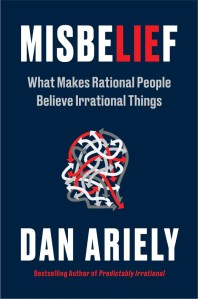Corrosive information, Shibboleth, Ramaswamy and my new book: MISBELIEF
A few weeks ago, David French wrote a very compelling and troubling OpEd in the New York Times, under the title: “The Articulate Ignorance of Vivek Ramaswamy.”
The main point focused on a response that Vivek Ramaswamy gave during the Republican debate to the question of whether Mike Pence did the right thing by certifying the presidential election on Jan. 6, 2021. Ramaswamy’s response was that if he was in Pence’s shoes, he would have “pushed for a new federal law to mandate single-day voting, paper ballots and voter identification.”
French then goes on to explain that this is “a crazy, illegal, unworkable idea on every level,” which of course it is. French then continues to wonder how can anyone make such an impractical and impossible statement. This is where French, and I suspect most people, miss an important shift in the current political communication landscape – a shift toward shibboleth.
What is shibboleth? As I explain in my new book MISBELIEF, the modern term shibboleth is based on a biblical story where two tribes, the Ephraimites and the Gileadites, pronounced the word shibboleth differently. After a bloody war between them, when someone tried to cross the river, they asked them to pronounce shibboleth and if the pronunciation was different from their own pronunciation, they person in question was killed. The way that social scientists use the term shibboleth is as a kind of linguistic password that identifies people’s belongingness to a group. This is also the key to better understanding our modern political discourse, and within it also understanding Ramaswamy and his comment.
My guess is that when Ramaswamy proposed his new federal law, he did not really mean it as a real solution to the question. Nor was he adding facts to the discussion. No — he was signaling. Imagine that Ramaswamy would have said something of the republican-run-of-the-mill category. Maybe he would have said that he would have gathered the Republican leadership to discuss the issue. Or maybe that he would have made sure to publicly register his protest. Any such more modest statements would not portray him as a real true Republican leader. They would just portray him as a standard Republican. In contrast, by saying something impossible and outlandish he is using shibboleth and marking himself as a person with the qualities of a true Republican leader.
This is where French was wrong in his analysis because he mistakenly assumed that the goal of Ramaswamy’s response was to communicate a true opinion and not to signal his loyalty and identity and suitability to Republican leadership.
While I hope that this analysis of the role of shibboleth in the current political discourse, this perspective should not give us any comfort and instead it should make us even more worried. In standard communication we expect people to say what they mean, to say the truth and to add facts to the discourse. Especially when the communication is public on well accepted media channels. When shibboleth takes the center stage and these basic assumptions no longer hold, the risk of false narrative increases dramatically.
The challenge with this analysis is that it doesn’t help us figure how to deal with a discussion that pretends to be about real information but is in fact a shibboleth kind of communication. What we need is to approach this problem in two ways: First, we need to understand this shibboleth strategy and figure out how to take some of the things that politicians say and treat them as loyalty statements, and not as informative speech. Second, we need to demand more from our politicians. We need to start having agreed upon standards for political discussions and it is best to set these clearly and before we get too deep into the election season, and ideally before the next debate.
P.S. Obviously, the problem of shibboleth is only limited to US politicians, and in other countries (Israel, UK, Brazil to name just a few) people, politicians, and social media are immune from this problem, but even so, it is useful to understand shibboleth and think about it as we go about consuming and producing information.
–Dan
If you would like to read my new book MISBELIEF, this page includes an option to order a copy for yourself + a copy to be donated to an educator. The book can also be found at Amazon, Bookshop.org, Audible, BAM, or Barnes & Noble.

 Tweet
Tweet  Like
Like